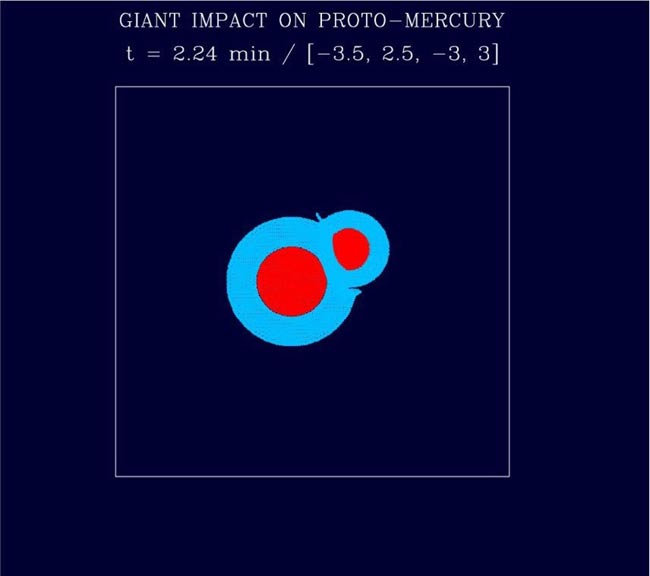Pieces of Mercury Found in Virtual Collision

Some 4.5 billion years ago, according to one theory, a giant asteroid collided with an even larger object, creating Mercury and shooting debris into space.
With the aid of new computer simulations, scientists have examined this apparent collision to suggest why the closest planet to the Sun is denser than anticipated and how some of the impact debris ended up on Earth and Venus.
moons are also thought to have been created by an impact, as was Earth's Moon.
In Mercury's case, the idea of a collision was spawned by the fact that the rocky world contains more metal than expected for its size. And until these simulations, "we were not sure why so little of the planet's outer layers fell back in and reattached following the impact," said Jonti Horner of Physikalisches Institut in Bern, Switzerland.
Horner's team looked at the behavior and composition of the two colliding bodies. They ended up with Mercury and a whole bunch of escaping fragments.
The simulation then followed the path of the ejected particles for several million years until the bits and pieces landed on a planet, were ejected from the inner solar system, or fell into the Sun.
The program showed it would take up to 4 million years for half of the particles to land back on Mercury-if they all fell back. By that time, however, much of the debris would have been carried away by solar radiation, explaining why Mercury retained much less material in its outer layers.
Get the Space.com Newsletter
Breaking space news, the latest updates on rocket launches, skywatching events and more!
In the simulation, some of the ejected material also landed on our planet and on Venus.
"The results we obtained show that a giant impact could explain the Mercury we see today," Horner told SPACE.com. "They also highlight the fact that material can be passed between the planets-we already know of meteorites which came from Mars, but none have yet been found which came from Mercury."
The study results will be presented at the Royal Astronomical Society's National Astronomy meeting Wednesday.
Join our Space Forums to keep talking space on the latest missions, night sky and more! And if you have a news tip, correction or comment, let us know at: community@space.com.










